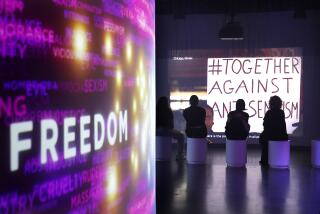Local Muslims Endure Wrath After Tragedy : Bombing: Stereotypes and ignorance of religion are blamed for the burst of spite that initially followed the attack in Oklahoma City.
You wouldn’t think that signing up to attend the Secretary’s Day luncheon in your office would cause a stir.
But when Saad Isah did that, just after the April 19 bombing of the Alfred P. Murrah Federal Building in Oklahoma City, the Arcadia resident was reminded anew that if you’re an American Muslim, even an innocuous act of kindness can invite pain.
No sooner had Isah lent his name to the sheet when someone scrawled near it “John Doe No. 2,” referring to the suspect in the deadly blast who, as of Wednesday, remained at large.
Though the arrest of Timothy J. McVeigh in connection with the bombing ultimately lifted suspicion from Muslim extremists, Isah and others say the burst of spite that initially followed the blast highlighted the blunt racism faced regularly by the nearly 30,000 San Gabriel Valley Muslims.
“I thank God it wasn’t a Muslim because we would have had a lot more tragedies on our hands,” said his wife, Semeen.
Once again, area Muslims say, a turn of world events has left them wary of a largely Christian society in which terrorist is attached to those with Middle Eastern appearances. Since the Oklahoma bombing, several Muslim organizations and mosques throughout the Southland have received threatening phone calls, according to Salam Al-Marayati of the Los Angeles-based Muslim Public Affairs Council.
An Islamic children’s school at the Mosque of Riverside was evacuated April 20 when a caller twice threatened to “kill all the children” there, said Hassan Abukar, director of the facility. Regular prayer services on a recent Friday, the Muslim holy day, were held at the mosque under police guard, Abukar said.
Despite the threats, no area Muslims were injured during the tense time, Al-Marayati said. But the angry calls bode ill, he added.
“This was predictable,” Al-Marayati said. “It’s also going to repeat itself unless we change the political and social climate of our society.”
“As hard as we’re trying to work to alleviate . . . misconceptions, somebody is working against us, turning the wheel as fast as we are,” said Semeen Isah. “So much for the melting pot.”
Widespread ignorance of Islamic beliefs--combined with a misconception that all people of Middle Eastern descent are Muslim--brews the stereotype of a terrorist-condoning religion, area Muslims say.
One-tenth of the world’s 1 billion Muslims are Arab, according to estimates. About 500,000 Muslims live in the Southland, and they constitute one of the world’s most ethnically diverse Muslim communities.
Experts say teachings of the Koran, widely misconstrued, do not advocate terrorist acts. They say the Koran expressly prohibits harming civilians, women, children and those of other faiths--all of whom were killed in the Oklahoma blast.
That, Muslims say, is lost in a country filled with overly simplistic Arab television portrayals, misplaced animosity lingering from the Gulf War and the conviction of Muslim extremists in the 1993 World Trade Center bombing that killed six people.
After the Oklahoma City bombing, the Isahs were leery enough to keep their daughter away from Arabic class, and the family largely stayed home. “I fear about my kids’ safety,” said Saad Isah, a Department of Water and Power engineer. “And this is not just me. This is a lot of people.”
The period after the World Trade Center bombing was far worse, said S. Arif Rizvi, a Covina physician active in Muslim affairs.
“This time, it wasn’t that bad,” he said.
News of a second domestic bombing fell on U.S. Muslims who have been striving to better acquaint society with their beliefs, said Khan Hameed, secretary of the San Gabriel Valley Islamic Center.
“Part of (any misconception) is our fault,” he said. “Being over here (in the United States), it is more important that we get involved. We are learning that.”
Rizvi said he believes further dialogue about mainstream Muslim beliefs may calm the rhetoric.
“We are like any other Americans,” Hameed said. “We see children getting injured and innocent people getting hurt, (and) we feel the pain and share the grief.”
More to Read
Sign up for Essential California
The most important California stories and recommendations in your inbox every morning.
You may occasionally receive promotional content from the Los Angeles Times.










